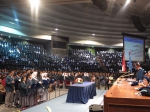Indicates Impact of Climate Variability Changes towards Natuna Sea, ITB Student Champions Over ICOFIMS 2022
By Adi Permana
Editor Adi Permana

BANDUNG, itb.ac.id – Muhammad Firman Nuruddin, a student of Institut Teknologi Bandung’s Undergraduate Study Program in Oceanography won 1st place at the online International Conference for Fisheries and Marine Sustainability (ICOFIMS) 2022. He won the category for Best “Biodiversity, Conservation, Climate Adaptation” Paper.
International Conference for Fisheries and Marine Sustainability (ICOFIMS), held on Tuesday (18/1/2022), is an annual conference organized by the University of Padjadjaran (Unpad), that aims to share knowledge as well as research regarding marine science and sustainability. In 2022, ICOFIMS adopted the topic of “The World of Marine Sciences Post-Pandemic and the Challenges of Facing Global Climate Change.”
At this conference, researchers from diverse backgrounds including university professors, institutional researchers, and college students were given the opportunity to share the fruit of their research. Through his internship experience in the Center of Maritime Resource Management, Unpad, Muhammad Firman attempted to reveal his research result in the form of submission for this conference. In the process of writing his scientific work, Firman was assisted by his peers from the Oceanography program including Nafisa Ardian Fikrani (2019), Parikesit (2020), and Tania (2020). The team was also mentored by Dr. Ir. Sunarto M.Si from Unpad.
In his work, Firman assesses the impact of climate variability changes on the Natuna Seas. “Natuna will be developed as a smart independent island. This too, hopefully, will be supported by the sea produce, renewable energy, and other sustainable elements. Unfortunately, from an oceanographic perspective – especially concerning the dynamics of the marine ecosystem – there is a scarce amount of study conducted in the Natuna Seas.”
The submitted research was also Firman’s internship project overviewing the Natuna region. It consisted of phytoplankton and zooplankton condition evaluation, as well as their observed changes, influenced by the climate variability of the Indian Ocean Dipole (IOD) and El Nino Southern Oscillation (ENSO).
Firman explained that the research focus revolved around phytoplankton and zooplankton as both organisms are very basic, yet their existence is crucial, especially in the oceans. Phytoplankton serves as an oxygen producer as well as regulating other primary productivity from the sun.
“Phytoplankton are like plants on land. They will also be consumed by the zooplankton (microzooplankton and macrozooplankton). If the producer and level one consumer are influenced by climate change, such as the rising sea temperature from El Nino, both will experience a decrease in number,” remarked the oceanography student.
According to Firman, the work composed alongside his team and Dr. Sunarto can be applied as a reference to the consequence of climate change passivity – it will be detrimental to the perpetuity of human lives. “We have proven quantitatively through this research that creatures like phytoplankton and zooplankton have suffered severe outcomes, so will we wait for a little more disaster to initiate some action? In summary, our research aims to spread knowledge; quantitative awareness from a real repercussion,” declared Muhammad Firman.
Reporter: Inas Annisa Aulia (Visual Art, 2020)
Translator: Firzana Aisya (School of Life Sciences and Technology, 2021)

.jpg)

.jpg)
.jpg)
.jpg)
